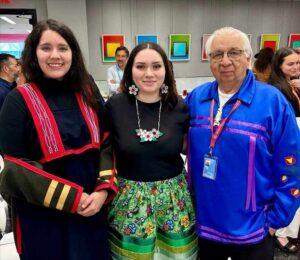‘Climate change is affecting our traditional practices,’ reports Anishinaabekwe at the United Nations

By Rick Garrick
NEW YORK CITY — Fort William’s Daanis Pelletier recently shared her community’s traditional production of maple syrup at the United Nations Permanent Forum on Indigenous Issues (UNPFII), held April 15-26, as part of her advocacy on food sovereignty. Pelletier, a Lakehead University Indigenous learning and philosophy student, attended UNPFII as a member of the International Committee for the Indigenous Peoples of the Americas (Incomindios) UNPFII 2024 team along with Cassandra Spade, a Lakehead University law student and Mishkeegogamang citizen, and two others, Crystal Lewis, from the Squamish Nation in B.C., and Dayana Blanco Quirgoa, from the Indigenous Uru Uru Team in Bolivia.
“The people I did talk to about [our maple syrup] were intrigued, especially because Canada is known for making maple syrup, but they were more intrigued that Indigenous people also make maple syrup,” says Pelletier, Incomindios’ UN Scholarship youth delegate. “There is a little ridge [on Anemki Wajiw] and the ridge creates the perfect weather conditions for the maple trees and for them to produce sap.”
Pelletier says they usually tap about 100 of the thousands of maple trees on Anemki Wajiw to make their maple syrup.
“This year, we found it was weird because due to environmental issues and climate change, the time that we usually tap the trees changed,” Pelletier says. “So that was important for me to talk about how climate change is affecting our traditional practices and how we do them.”
Pelletier says her community has produced maple syrup for many years, noting they have found old newspaper articles about the practice as well as old maple syrup production equipment on Anemki Wajiw.
“It was stopped for a few years but it was important to bring back that process and continue to practice it as a tradition for my community,” Pelletier says, noting they do not profit from the maple syrup production and usually give the maple syrup back to those people who helped out as well as Elders or others from the community. “There used to be a sugar shack up there and over the years you could find things like spigots and other little things they used for mapling. Originally they did everything up on the mountain (but now we) bring all the liquid down and boil it down here.”
Pelletier says it was amazing to see all of the different Indigenous people from around the world at the UNPFII.
“They all held an importance of language and the land,” Pelletier says. “All throughout the world, everyone is still fighting for kind of the same causes.”
Spade, Incomindios’ first Indigenous UNPFII youth mentor who previously was an Incomindios UN Youth Scholarship delegate in 2019, says her advocacy at UNPFII was about Indigenous language revitalization.
“I called on states, the United Nations, and other delegations to support and endorse a convention on Indigenous languages, which would work to have stronger legal protections for Indigenous languages globally,” Spade says. “My main form of advocacy was language revitalization, retention, and protection, and then at the same time, we called on the UN to enhance the participation of youth and specifically Indigenous youth.”
Spade says she had the opportunity to take the plenary floor and speak directly to the United Nations.
“It was an amazing opportunity, it’s really exciting to be able to speak in front of the United Nations and it’s also like a big adrenaline rush,” Spade says.
Spade says she also had an opportunity to do a prayer in Anishinaabemowin at the United Nations.
“A lot of older people and Elders came up to me really excited and encouraged that young people are starting to advocate for language revitalization and looking at ways to protect it and also trying to speak it more often,” Spade says. “I’m trying to find as many ways as possible to protect the language. I do free Anishinaabe language classes, I advocate for the language in the legal field so the work I’ll be doing this summer is about legal reform and specifically language revitalization, and then I also go to the United Nations — the first time I went was in 2019 for the Year of Indigenous Languages and I keep advocating for stronger legal protections and more funding.”


